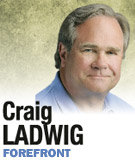Subscriber Benefit
As a subscriber you can listen to articles at work, in the car, or while you work out. Subscribe Now
 A friend in the Chamber of Commerce Building has a chart on his wall that seems out of place in the office of an attorney—a framed copy of “Zimbabwean Corn Production 1975-2007.” His explanation serves as an education in economic development, or un-development.
A friend in the Chamber of Commerce Building has a chart on his wall that seems out of place in the office of an attorney—a framed copy of “Zimbabwean Corn Production 1975-2007.” His explanation serves as an education in economic development, or un-development.
The chart is made up of data points representing annual production, beginning with the year of Zimbabwe’s independence. It is there to remind my friend to hedge his bets on official economic development (eco-devo in bureaucrat lingo), even and especially when close to home.
He will point out the year 2002. That’s when the production figures, defying weather, dropped below all but the worst drought years. That was the beginning of Zimbabwean “land reform,” in truth the official degradation of private property.
Is it hyperbolic to relate anti-colonialism in the African Corn Belt to the machinations of the Capital Improvement Board, the Metropolitan Development Commission or the Indianapolis mayor’s office?
Perhaps, but you still might want to consider the chronicle of the N.K. Hurst Co. Its negotiations with the city of Indianapolis under threat of eminent domain were, let us say, Zimbabwean.
Fred McCarthy, the former president of the Indiana Manufacturers Association, has built a case file on the company, a local business whose misfortune was to sit on land “needed” for a more politically connected one, i.e., a then-high-riding professional football franchise known as the Indianapolis Colts.
McCarthy’s reports for the Foundation for Economic Education and on his blog, Indy Tax Dollars, challenge anyone to argue that Hurst would have been any worse off dealing with a Third World totalitarian government. McCarthy notes that the terms of Hurst’s final agreement with Indianapolis require the company to ask official permission for the most basic business transactions regarding the property—and to do so for 30 years.
Colts boosters might contend that the comparison is raw, that City Hall is more economically savvy than the Zimbabweans, and certainly better intentioned.
Really? History tells us that whenever and wherever private property becomes a matter of political negotiation rather than written law, there is disaster. Keep in mind that the property rights of N.K. Hurst were compromised not for a road or a sewer but for an entertainment venue. Whether or not the Hurst family is resigned to the agreement, other investors (job makers) are forewarned that in Indianapolis the official bar for justified theft is so low as to be dissuading.
McCarthy, indeed, considers it a blot on the city’s history.
“Surely this governmental bullying of small business, which politicians are so fond of claiming as the heart of the economy, would not be overlooked by a firm seeking a new site in our city,” he warns.
Back to the corn chart: A direct cause of the drop in production was the decision by the new “owners” of the confiscated land, the regime’s henchmen, to withhold investment. They well understood that politics had trumped property and that they could lose their money on an executive whim. So they delayed planting, instead putting their cash and precious metals in foreign banks, where it would be safe from people such as themselves.
Today, in supposedly more sensible Indiana, it is a good bet that those making money off the grand boondoggles of our time—the stadiums, the convention centers and the music halls—will not be buying “seed corn” for planting here. Their money will go elsewhere, to places where the rule of law prevails over political faction, where a family business like Hurst is safe, where cronyism is held in check by a system of individual rights rather than government needs.
The corrupt are corrupt, you see, not stupid. They ride in on horses named “Best Intentions,” “Inarguable Good” and even “Go Blue.” And democracy in and of itself, without free markets and constitutional counterweight, is no protection from them.
Check the corn chart.•
____________
Ladwig edits Indiana Policy Review, a quarterly journal studying local public policy. Send comments on this column to [email protected].
Please enable JavaScript to view this content.
